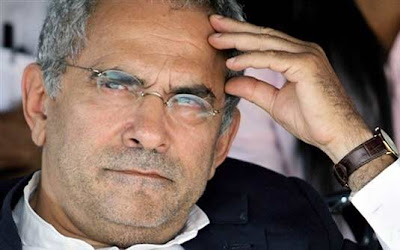Quinta-feira, 15 de Março de 2012
The Sydney Morning Herald - Karlis Salna, AAP South-East Asia Correspondent - March 15, 2012
APP
East Timor's incumbent president, Jose Ramos-Horta, remains nonchalant even though this weekend could mark the beginning of the end for his career as one of the country's most respected and renowned political figures.
East Timorese will vote on Saturday in the first round of presidential elections which will also mark 10 years since one of the world's youngest nations gained independence.
If no candidate scores at least 50 per cent of the vote, a second-round run-off between the top two candidates will be held a fortnight later.
Mr Ramos-Horta, a former prime minister and one of three front-runners in the 2012 presidential poll, has been a key player in both East Timor's path to independence during a brutal 24-year occupation at the hands of Indonesia, as well as its democratic trajectory since.
But it is becoming increasingly likely the Nobel Peace Prize winner will bow out of the race this weekend, with observers on the ground suggesting the poll is shaping up as a contest between Francisco "Lu Olo" Guterres, from the traditionally strong leftist Fretelin party, and the country's former defence forces chief Taur Matan Ruak.
In 2007, it was the endorsement of Prime Minister Xanana Gusmao's National Congress for the Reconstruction of East Timor party (CNRT) which saw Mr Ramos-Horta win the run-off with 69 per cent of the vote, after having trailed Mr Guterres in the first round.
Prime Minister Gusmao and CNRT, however, have since shifted their support to Mr Ruak, delivering a blow to Mr Ramos-Horta and his chances of re-election.
Even so, the 40-year veteran of the East Timorese political scene, who served as the exiled spokesman for the resistance during the years of the Indonesian occupation, appears at peace.
"I don't feel one way or another," Mr Ramos-Horta told AAP of his chances during what has been a deliberately low-key campaign.
Mr Ramos-Horta has previously suggested that his desire to run again had waned. Before he announced his candidacy in January, he had said he was "almost determined not to seek a second term".
"I feel that I'm confident enough about the country, the way it is and how it's going that I can say it doesn't need me," he said at the time.
He finally threw his hat into the ring in January after meeting 2000 supporters from East Timor's 13 electoral districts. They presented him with a petition that Mr Ramos-Horta's office said carried the signatures of more than 100,000 people pleading for him to stand for re-election.
Even so, he faces an uphill battle in overcoming the campaigning power of Fretelin and CNRT in a poll which is also seen as a key pointer to the outcome of parliamentary elections in mid-June.
East Timor's economy, although largely driven by oil revenue, has maintained average growth of close to 10 per cent over the past five years under the Gusmao government.
A petroleum fund set up to manage oil revenues was as of September last year valued at more than $8 billion.
According to analysts, the country's improved stability will help shore up support for CNRT and in turn for Mr Ruak, meaning fewer votes for Mr Ramos-Horta.
However, the main opposition party Fretelin maintains that many East Timorese have been left behind, with Mr Guterres saying the government had "roundly failed" to provide for the basic needs and demands of the people.
"The economy (apart from oil) is not productive and the lives of the people in every aspect are turning more difficult," he said.
One issue upon which all three leading candidates agree is that East Timor must avoid returning to the violence and factional fighting which took the country to the brink of civil war in 2006, and which marred elections in 2007 and led to assassination attempts on Mr Ramos-Horta and Mr Gusmao in 2008.
All three candidates also share the view that the contingent of just under 1000 United Nations security personnel and some 400 Australian troops, deployed in the wake of the 2006 unrest, must leave East Timor by the end of the year.
© 2012 AAP
.

Sem comentários:
Enviar um comentário